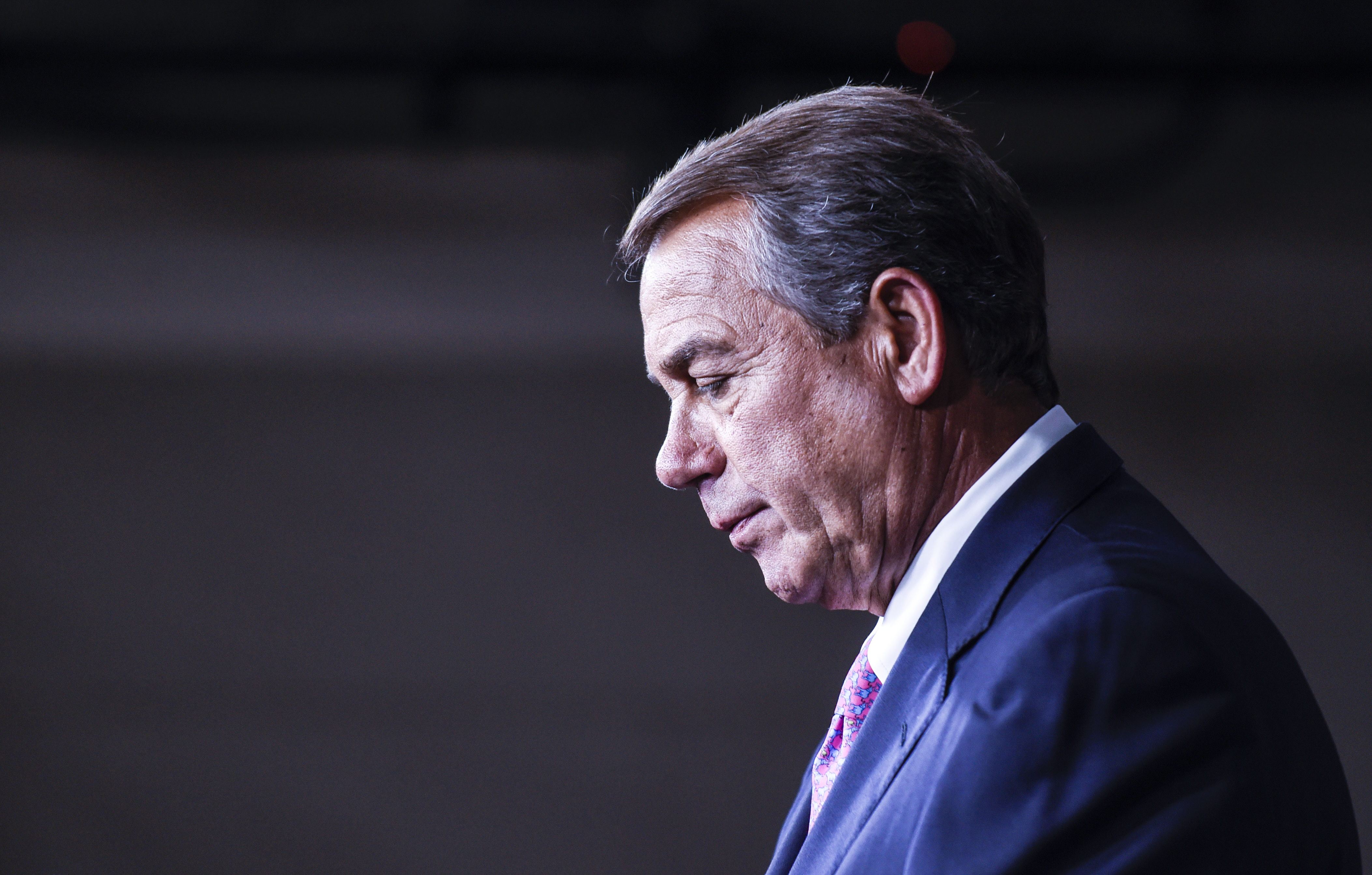Why Boehner bowed out
The party he represented was not the party he governed


Well, now we know why he was so emotional yesterday. John Boehner, a devout Catholic, had wanted to see a pope address the U.S. Congress, his U.S. Congress, for 20 years. But now the pope has left Washington — and for Boehner, it would have been all downhill from there. No wonder he's resigning — not only as House speaker, but from Congress altogether.
Boehner faced, yet again, the threat of a full-scale revolt from conservatives if he refused to bring forward legislation to shut down the government in order to protest Planned Parenthood. Add to that the struggle to pay for an extension of the highway fund, the looming vote to extend the federal debt ceiling — all set against the backdrop of an angry and energized conservative base that has given Boehner no quarter, and, in fact, has come to dislike him actively, so much so that they are coalescing around presidential candidates who are running as much against the GOP leadership as they are against the Democratic president. No wonder Boehner bowed out.
This grueling struggle has been Boehner's life since he was elected speaker in 2010. The Ohio Republican is supposedly a happy warrior, but during his tenure, the only victory he’s known is victory itself: The GOP's historically massive midterm rout of Democrats in 2010, plus another big midterm victory in 2014. Boehner's GOP began this 114th Congress with control of 247 of the House's 435 seats — their largest majority in nearly 100 years. And yet: He could do nothing with his majority. The House tried to defund ObamaCare 55 times. The government shut down once. Boehner rammed through unpopular temporary funding bills three times. So many new members of his party came to power determined to challenge him, and funded by sectors of his party that did not believe (as he privately did) that comprehensive immigration reform was wise, or even that trade bills, a staple of conventional economics, were fair.
The Week
Escape your echo chamber. Get the facts behind the news, plus analysis from multiple perspectives.

Sign up for The Week's Free Newsletters
From our morning news briefing to a weekly Good News Newsletter, get the best of The Week delivered directly to your inbox.
From our morning news briefing to a weekly Good News Newsletter, get the best of The Week delivered directly to your inbox.
As the press waited for Boehner to announce his resignation on Friday morning, television viewers watched the pope call on world leaders to restrain their "exercise of power." Boehner, at the end, has almost none.
His collegial, old-school relationships with fellow lawmakers have kept him in office, as has his personal probity. But he was not built for a political era of intense partisanship. By the end of September, as his allies openly spoke of having to rely on Democratic votes to survive a leadership challenge, he evidently decided that he had had enough. The party he represented was not the party he governed. His resignation was a surprise, but it was not a shock.
A free daily email with the biggest news stories of the day – and the best features from TheWeek.com
Marc Ambinder is TheWeek.com's editor-at-large. He is the author, with D.B. Grady, of The Command and Deep State: Inside the Government Secrecy Industry. Marc is also a contributing editor for The Atlantic and GQ. Formerly, he served as White House correspondent for National Journal, chief political consultant for CBS News, and politics editor at The Atlantic. Marc is a 2001 graduate of Harvard. He is married to Michael Park, a corporate strategy consultant, and lives in Los Angeles.
-
 Political cartoons for December 14
Political cartoons for December 14Cartoons Sunday's political cartoons include a new White House flag, Venezuela negotiations, and more
-
 Heavenly spectacle in the wilds of Canada
Heavenly spectacle in the wilds of CanadaThe Week Recommends ‘Mind-bending’ outpost for spotting animals – and the northern lights
-
 Facial recognition: a revolution in policing
Facial recognition: a revolution in policingTalking Point All 43 police forces in England and Wales are set to be granted access, with those against calling for increasing safeguards on the technology
-
 Has Zohran Mamdani shown the Democrats how to win again?
Has Zohran Mamdani shown the Democrats how to win again?Today’s Big Question New York City mayoral election touted as victory for left-wing populists but moderate centrist wins elsewhere present more complex path for Democratic Party
-
 Millions turn out for anti-Trump ‘No Kings’ rallies
Millions turn out for anti-Trump ‘No Kings’ ralliesSpeed Read An estimated 7 million people participated, 2 million more than at the first ‘No Kings’ protest in June
-
 Ghislaine Maxwell: angling for a Trump pardon
Ghislaine Maxwell: angling for a Trump pardonTalking Point Convicted sex trafficker's testimony could shed new light on president's links to Jeffrey Epstein
-
 The last words and final moments of 40 presidents
The last words and final moments of 40 presidentsThe Explainer Some are eloquent quotes worthy of the holders of the highest office in the nation, and others... aren't
-
 The JFK files: the truth at last?
The JFK files: the truth at last?In The Spotlight More than 64,000 previously classified documents relating the 1963 assassination of John F. Kennedy have been released by the Trump administration
-
 'Seriously, not literally': how should the world take Donald Trump?
'Seriously, not literally': how should the world take Donald Trump?Today's big question White House rhetoric and reality look likely to become increasingly blurred
-
 Will Trump's 'madman' strategy pay off?
Will Trump's 'madman' strategy pay off?Today's Big Question Incoming US president likes to seem unpredictable but, this time round, world leaders could be wise to his playbook
-
 Democrats vs. Republicans: who are US billionaires backing?
Democrats vs. Republicans: who are US billionaires backing?The Explainer Younger tech titans join 'boys' club throwing money and support' behind President Trump, while older plutocrats quietly rebuke new administration
